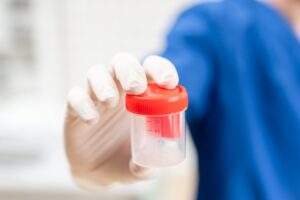 Osteoporosis literally means ‘porous bones’ – bones that are filled with tiny holes. In bones affected with osteoporosis, new bone formation does not keep up with bone loss (this is called bone turnover), which causes the bones to become more brittle with age. As bone is lost, the skeleton continues to have a normal composition but it becomes porous, hyper-mineralised and more fragile and it is easier for the bones to break. Read more about Osteoporosis and how we can help here
Osteoporosis literally means ‘porous bones’ – bones that are filled with tiny holes. In bones affected with osteoporosis, new bone formation does not keep up with bone loss (this is called bone turnover), which causes the bones to become more brittle with age. As bone is lost, the skeleton continues to have a normal composition but it becomes porous, hyper-mineralised and more fragile and it is easier for the bones to break. Read more about Osteoporosis and how we can help here
While a bone density scan is the gold standard of diagnosing established osteoporosis, identifying your current rate of bone loss is the key to preventative treatment. If you make positive changes to your diet and lifestyle to improve bone health, an improvement in bone turnover is measurable by repeated test. However, you might have to wait two years for a repeat bone density scan, which is just another ‘snap shot’ of your bone density and will not tell you whether your changes have improved your current rate of bone loss.
How does the test work?
The bone turnover test provides a measure of the excretion of deoxypyridinoline (DPD) a very specific marker of bone metabolism. Urinary levels of DPD correlate with the rate of bone loss, and when there are increased amounts of DPD in the urine there is an increased rate of bone destruction.
The report that you will receive will show your DPD level. If your result is higher than the normal range, you are currently losing more bone than would be expected. The higher the result, the more bone you are losing and thus the greater likelihood of developing osteoporosis. If your result is out of range, we can adapt your protocol and personal recommendations to optimise your bone health and improve your rate of bone loss before your next DEXA scan.
Who should take this test?
- Anyone concerned about their bone health
- Women approaching the menopause for preventative change
- Women who are going through or have gone through the menopause for monitoring of bone degradation at this time
- People who have been diagnosed with osteopenia or osteoporosis
If you are interested in functional medicine testing: please contact us at clinic@glenvillenutrition.ie or make an enquiry online. We have a number of different tests available and it is most helpful, and cost effective, to carry out an initial assessment with your nutritionist before testing.

